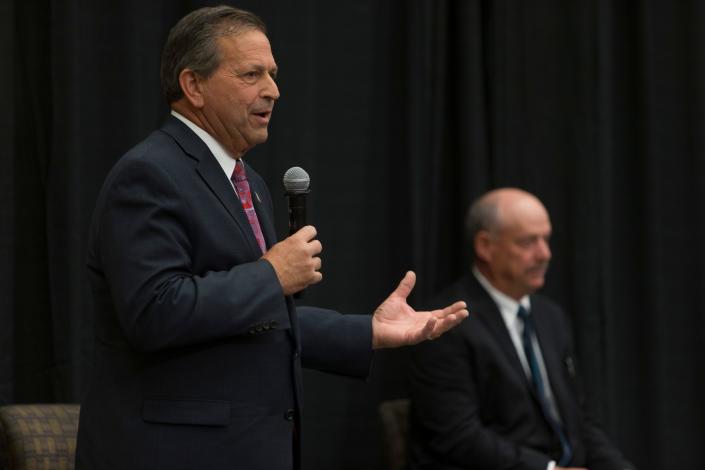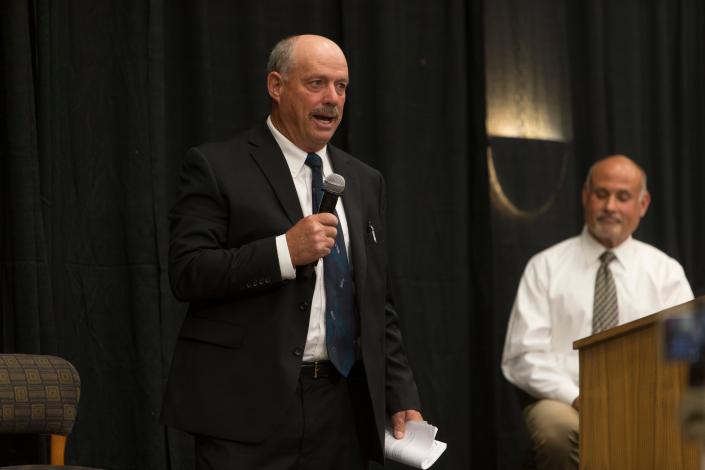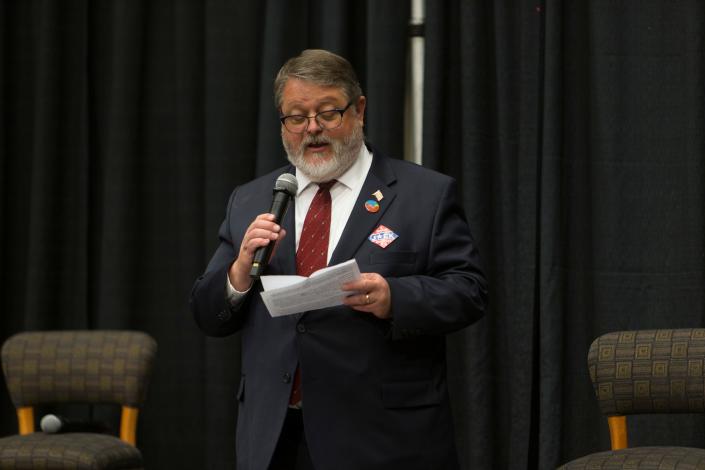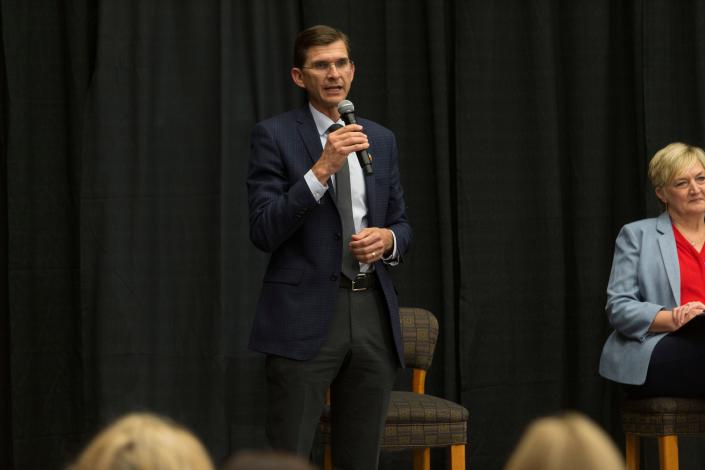Republican primary debates feature new faces, discussions on water, growth and education
With a little more than a month to go before the 2022 primary election, Washington County Republicans gathered at the Dixie Convention Center on Tuesday to debate each other on water, growth, education, the “Dixie” name and more.
The local Washington County Republican Party (WCRP) hosted the debates, holding one general debate between county commission candidates Gil Almquist and Allen Davis before separating into three different rooms for the three state House district debates: House District 72 between Willie Billings and Joseph Elison; District 74 between Neil Walter and Kristy Pike; and Colin Jack in District 75, who held a solo question-and-answer session when his opponents Nina Barnes and Travis Seegmiller weren’t in attendance.
These debates featured only local candidates, with the debates for federal offices, including the 2nd Congressional district currently held by U.S. Rep. Chris Stewart and the U.S. Senate seat currently held by Sen. Mike Lee, scheduled for June.
The primary election is slated for June 28 this year, with vote-by-mail ballots expected to be sent to residents earlier in the month.
County Commission

Although all three county commission seats are up for election this year, only one features a primary election. Gil Almquist, the incumbent commissioner, faces a challenge this year from Allen Davis, who works for the Energy Services department with the City of St. George.
Expanding the commission
The debate started off with the question of whether the county commission should be expanded from a three-member body to five members, with Davis having recently joined a cross-partisan group of residents petitioning for the change.
Davis said he supports expansion since the three-member commission is the smallest possible. With the rapidly expanding population of Washington County, he said adding more voices to the commission would be a positive thing.
“I just feel like we’ve outgrown that,” Davis said. “I feel like it’s time. I feel like we need some more representation.”

Davis says he’s actively working to make the petition official and gather signatures for it.
Almquist said he is against expansion, arguing that he thinks it’s best to keep government small. It would cost $759,000 to expand the commission, Almquist said, and there isn’t money in the budget to make the change without raising taxes.
“If it ain’t broke, don’t fix it,” he said.
Like in most Utah counties, Washington County’s commissioners work in both a legislative and administrative role, with members working full time in the county offices. Each commissioner’s position was paid more than $141,000 in 2021, according to the state auditor’s office.
Water conservation
Asked about water issues, both candidates said they support conservation measures to combat the ongoing drought, in addition to the construction of more infrastructure projects. Almquist highlighted new reservoir projects like the proposed Graveyard Wash Reservoir while Davis complained that these projects aren’t moving fast enough.
One point of disagreement was whether they would support putting a moratorium on new construction if the drought were to continue.
Almquist said he was against the idea, calling it “Un-American” and arguing that collaboration between local governments on the issue could solve a lot of problems.
THANK YOU: Subscribers’ support makes this work possible. Help us share the knowledge by buying a gift subscription.
DOWNLOAD THE APP: Get the latest news, sports and more
Davis said a moratorium might be necessary at some point, saying the government needs to supply water in “good conscience” to homes and that he doesn’t want current residents to make sacrifices for future residents.
“If in order to fill those pipes, we have to take water from somebody else, somebody that’s here right now somebody that’s voting for me right now, to supply a home for somebody that might be here in 10 years, there’s a lot of problems with that,” Davis said.
Saving the ‘Dixie’ name
Dixie State University is set to change its name to Utah Tech University this summer, a sore subject among some local Republicans, with many fighting to keep the “Dixie” name, arguing it is an important part of the local heritage.
Almquist said he would be a “champion” for the term, which was first used for the area when it was settled by pioneers from The Church of Jesus Christ of Latter-day Saints in the 1860s. He said the county and other governments could do more to have the name used in different places, noting that the commission recently passed a resolution in support of keeping the name of the college and that it also changed the name of Old Highway 91 to Old Dixie Highway 91. Almquist also shared that Dixie Technical College has been “warned” about not changing its name.
Dixie State readies name change: New Utah Tech logos, plans for summer projects
Davis says he also supports the “Dixie” name and said he thought the county should have tried harder to keep state lawmakers from going along with the school’s proposal to change the name.
“I would have gone talked with state representatives and said ‘look, you know, we’re not going to let this go,” he said. “This cancel culture thing is a temporary thing. We’re not going to let it go.”
Related: Dixie State-Utah Tech name change a ‘litmus test’ for some Washington County Republicans
This primary will be a rematch of sorts since Davis campaigned for this county commission seat the last time it was open in 2018. During that primary, Davis won a majority of support from delegates at the county convention but Almquist was able to get more votes — approximately 66% — from the primary election.
This year at the county convention, Almquist received roughly 57% of delegate votes and Allen got just over 43%.
The winner of this primary will face Robert Ford, a Democrat, during the general election in November. The other county commission elections will also have the Republican incumbents go against Democratic challengers. For seat B, Victor Iverson, the Republican incumbent, faces a challenge from Chuck Goode. For seat C, Republican Adam Snow, who was recently appointed to finish the term of the late county commissioner Dean Cox, faces Rebecca Winsor for a shortened term of two years.
House District 73

Technically, this race so far is a three-way competition between Travis Seegmiller, Colin Jack and Nina Barnes for a district that covers parts of St. George, Washington City and Leeds.
But it’s unclear whether Seegmiller, who is still a sitting state representative for District 62, the previous version of this district before it was redrawn last year, plans to stay in the race.
Seegmiller is an attorney who retired from teaching at Dixie State University in the summer of 2020. Jack is the chief operating officer for Dixie Power and Barnes is a self-employed real estate manager, according to the conflict of interest reports these candidates filed with the lieutenant governor’s office.
One-man show
For the debate, Jack was the only candidate to show up.
Seegmiller’s status for this election is uncertain and Barnes said that because of her role as vice chair of the Utah Board of Higher Education she had a conflict in Orem and couldn’t attend the debate. She did provide a statement to the WCRP, however.
“I look forward to continuing to work hard and reach out to Utah families that are concerned about the future of our state and finding compassionate solutions to our problems,” Barnes said in the statement, which was read by the WCRP chair, Lesa Sandberg.
Jack then took to the stage by himself, taking questions for most of the hour. In his opening statement, he said he’s been a Republican that’s supported every GOP presidential candidate from Ronald Reagan to Donald Trump. He also stated he’s been involved in county politics for the past 15 years and his main goals are protecting liberties and having fiscal restraint.
Jack also railed against the Utah law that allows for candidates to gather signatures for a primary election rather than needing to earn a spot through the party’s convention, saying it was a way for the “ultra-wealthy elites” on the Wasatch Front to influence elections.
Barnes did not compete for the nomination through the party convention and instead collected signatures to get a spot on the primary ballot.
At the convention, Jack was able to get more delegate support with 56% of the vote, compared to Seegmiller’s 44%.
Jack said that one of his legislative priorities would be to eliminate the signature-gathering method.
Seegmiller resignation
Recently, Seegmiller reached an agreement with prosecutors over an alleged poaching incident that took place in 2021 where Seegmiller pleaded to a charge of taking wildlife while trespassing. Two other counts of unlawful discharge of a firearm were dismissed.
Shortly after Seegmiller legally settled this issue, he told Republican leadership in the Legislature he would be resigning from his position for the remaining months of his current term, saying in a letter that he is moving outside of the district.
But Seegmiller’s status for the 2022 election is still unclear. He hasn’t technically withdrawn from the race and he hasn’t responded to any questions from The Spectrum on his status. Sandberg said the county party still isn’t clear on the issue either, saying that if he does move outside of district 73 he’s not eligible to hold office.
“He hasn’t indicated to me at which point he’s going to sign the withdrawal paper,” Sandberg said. “I encourage voters to vote for one of the other two candidates so their vote isn’t wasted.”
The party has scheduled a special election for June 1 where members of GOP leadership would vote for a replacement to fill out the rest of Seegmiller’s term. So far, Jack was the only one to file for that election, with Barnes issuing a news release that said she wouldn’t run and that she thought the timing of the special election was suspect, being held just before voters received ballots for the primary.
Party bylaws say a special election only needs to occur “within 30 days of a vacancy arising due to ‘death, resignation, or disqualification’ — not notice of intent to vacate,” the release stated.
“By seeking to fill a seat that has not yet been vacated merely one week prior to the mailing of primary ballots to registered Republicans in Washington County, party insiders have created an avenue to inappropriately influence a sacred democratic process,” Barnes said in the release.
With Seegmiller still technically in the race, all these candidates have over five figures in contributions, according to the latest campaign finance reports. Jack had just over $13,300 in cash, while Barnes had more than $26,300 and Seegmiller was just under $24,300 in campaign cash.
House District 72

There are two candidates in the primary for House District 72, Willie Billings and Joseph Elison. Neither has held elected office before and this seat is open since Brad Last, who represented the previous iteration of District 72, announced his decision to not run for another term after 20 years in the Legislature.
This district covers the eastern part of Washington County and Hurricane.
Both Billings and Elison have similar careers since they both are self-employed in the finance industry. Billings works for the Billings Financial Group and Elison works for the Elison Financial group.
The similarities don’t end there, as Billings said he and Elison would likely act in “lock-step” on most issues and both candidates praised the other for espousing conservative values.
Student scholarships

Both candidates said they support prioritizing parental rights when it comes to education and that wage increases should happen quickly across the board. Elison promoted one education idea from the past legislative session, the HOPE scholarship or HB 331, which was a failed bill that would’ve allowed for students not in the state school system to get scholarships.
“I think it’s a great idea since there is a lot of pressure on our schools,” said Elison.
Water and the Lake Powell Pipeline
Another main issue of discussion between the two was around water. Billings said he believes “God creates water” and isn’t overly concerned about the water future but noted conservation and acquiring more water for Washington County is necessary for the future.
Elison echoed similar ideas, saying the region needs to conserve it and “act like we live in a desert.” He also threw his support behind the Lake Powell Pipeline, saying that Washington County needs it for growth.
Campaign spending
At the county convention, Billings got 62% of the delegate vote, just over the 60% threshold that would normally void a Republican primary but Elison collected signatures to ensure his place on the primary ballot.
If Billings is able to win, he won’t be the only public official in his house because his wife, Nanette, is in her first term as mayor of Hurricane.
The most recent campaign finance reports show Billings has a large lead over Elison for campaign funds. Campaign finance reports say Billings has approximately $54,500 in contributions, while Elison only has just over $4,500.
House District 74

This is another race with no incumbent, since incumbent District 74 Rep. Lowry Snow announced he wouldn’t seek reelection. The two candidates are Neil Walter, the CEO of ERA Brokers, and Kristy Pike, the director of the Washington County Children’s Justice Center and wife of former St. George Mayor Jon Pike.
This district covers the southwest portion of Washington County, including the southern parts of St. George and Santa Clara.
Both candidates emphasized education as a major priority. Pike said she supports more funding for schools while Walter said he is worried about the types of things being taught.
“Our schools need to be a safe place for people that do not want to be bombarded by the social justice and social change movement,” Walter said.
Pike said she wants to create more support for first responders’ mental health concerns and put more funding into that area.
“There’s a lot more work to be done. Our first responders see horrific things, they need our support,” she said.
Water conservation

When the issue of water was brought up, both Walter and Pike stressed the seriousness of the issue and the need for a strong direction when it comes to water future.
Walter said water conservation is important but that other states, not Utah, are making the drought worse.
“When we are seeing Lake Powell and Lake Mead we are not seeing an overconsumption of Utah’s water resource, we are seeing an overconsumption of California, Arizona and Nevada’s resource that is now being made our problem,” he said.
Pike said water should be the No. 1 issue for southern Utah and that the area needs to “get a handle on it” by getting the most out of what water is available.
“We’ve built reservoirs, dams and canals and the same thing needs to happen now,” Pike said. “But there is more that we can still do.”
Voluntary conservation methods need to continue, and the state needs to invest in southern Utah water projects, Pike said.
At the county convention Walter got approximately 74% in the final round of voting. Pike didn’t make it to the final round of voting at the convention but was able to get on the primary ballot by collecting signatures.
Pike has outraised Walter for campaign cash, having raised just over $18,000 while Walter has raised $10,800.
Sean Hemmersmeier covers local government, growth and development in Southwestern Utah. Follow on Twitter @seanhemmers34. Our work depends on subscribers so if you want more coverage on these issues you can subscribe here: http://www.thespectrum.com/subscribe.
This article originally appeared on St. George Spectrum & Daily News: Utah primary 2022: Washington County GOP debate ahead of June election




